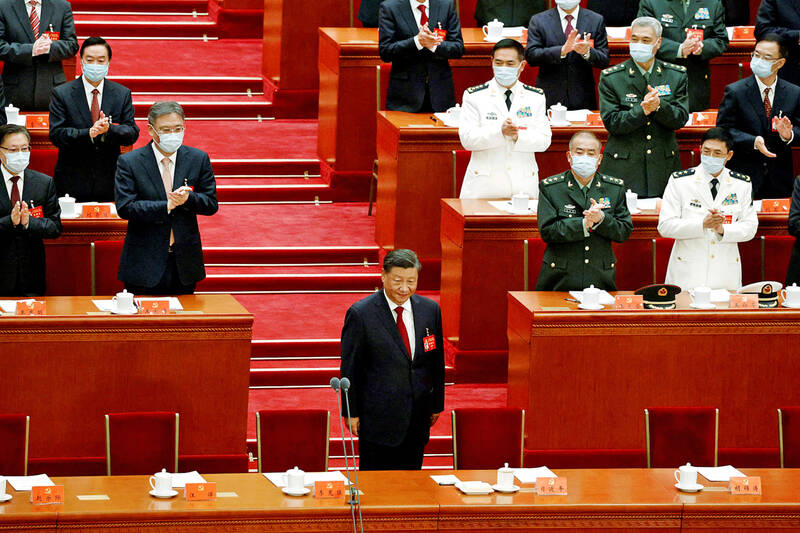Chinese President Xi Jinping’s (習近平) remarks about Taiwan at the Chinese Communist Party’s (CCP) 20th National Congress yesterday were intended as a warning to the US, Taiwanese academics said.
Xi said in his opening speech at the congress that “the issue of [China’s unification with] Taiwan is for Chinese to solve, and for Chinese to make decisions on,” and China would “never renounce the use of force” in the effort.
Other statements related to Taiwan in the final report from the congress included references to “peaceful reunification,” adapting China’s “one country, two systems” framework to Taiwan, Beijing’s “one China” principle and the “1992 consensus.”

Photo: Reuters
The so-called 1992 consensus refers to a term that former Mainland Affairs Council chairman Su Chi (蘇起) in 2006 admitted making up in 2000.
Xi also said there is “strong support for patriotic reunification” among Taiwanese.
The congress showed a clear focus on opposing interference by external forces in what China views as internal issues, Taiwan Society of International Law deputy secretary-general Lin Ting-hui (林廷輝) said at a forum held by the Cross-Strait Policy Association in Taipei yesterday.
Xi’s comments were meant to draw a red line around Taiwan for the US’ awareness and to serve as a warning to Washington, he said.
US-China relations are likely to grow more unstable, which could affect Taiwan, he said, adding that Taipei should prepare for such a contingency.
Some statements about Taiwan were new to this year’s CCP congress, association secretary-general Wang Chih-sheng (王智盛) said.
Among the remarks in the final report was a claim by Xi that China was “putting our best effort into unifying Taiwan peacefully, but will not renounce the use of force if necessary,” as well as claims that China had “always worked to benefit Taiwanese compatriots, and works at promoting cross-strait exchanges.”
The final report also said that China was “working to improve the ‘one country, two systems’ framework,” and that it would need to “consult with people from all parties and all walks of life in Taiwan” on its implementation.
The CCP congress this year was largely focused on opposition to Taiwan’s independence, as well as to foreign interference in what China sees as its own affairs, National Chengchi University Graduate Institute of East Asian Studies professor Wang Hsin-hsien (王信賢) said.
Beijing sees the issue of Taiwan as being inseparably related to its strategic competition with the US, Wang said.
“In the past, China was in a rush to deal with Hong Kong, and was slower in its approach to Taiwan,” he said. “Now Beijing sees Hong Kong as having stabilized, but there’s been some developments regarding Taiwan, so its likely to shift focus.”
The previous National Congress report in 2017 mentioned the “1992 consensus” several times, but this year the report only mentioned it once, he said.
“This shows that Beijing is no longer seeing the issue of Taiwan as being only about the cross-strait relationship. For Beijing, the Taiwan issue is now embedded in the US-China relationship,” he said.

Chinese spouse and influencer Guan Guan’s (關關) residency permit has been revoked for repeatedly posting pro-China videos that threaten national security, the National Immigration Agency confirmed today. Guan Guan has said many controversial statements in her videos posted to Douyin (抖音), including “the red flag will soon be painted all over Taiwan” and “Taiwan is an inseparable part of China,” and expressing hope for expedited reunification. The agency last year received multiple reports alleging that Guan Guan had advocated for armed reunification. After verifying the reports, the agency last month issued a notice requiring her to appear and explain her actions. Guan

GIVE AND TAKE: Blood demand continues to rise each year, while fewer young donors are available due to the nation’s falling birthrate, a doctor said Blood donors can redeem points earned from donations to obtain limited edition Formosan black bear travel mugs, the Kaohsiung Blood Center said yesterday, as it announced a goal of stocking 20,000 units of blood prior to the Lunar New Year. The last month of the lunar year is National Blood Donation Month, when local centers seek to stockpile blood for use during the Lunar New Year holiday. The blood demand in southern Taiwan — including Tainan and Kaohsiung, as well as Chiayi, Pingtung, Penghu and Taitung counties — is about 2,000 units per day, the center said. The donation campaign aims to boost

The Kaohsiung Tourism Bureau audited six hotels in an effort to prevent price gouging ahead of Korean band BTS’ concert tour in the city scheduled for Nov. 19, 21 and 22 this year. The bureau on Friday said that the audits — conducted in response to allegations of unfair pricing posted on social media — found no wrongdoing. These establishments included the local branches of Chateau de Chine, Hotel Nikko, My Humble House, and Grand Hai Lai, it said, adding that the Consumer Protection Commission would have penalized price gougers had the accusations been substantiated. The bureau said the Tourism Development Act

The military yesterday said it has located the flight data recorder, or black box, of an F-16V jet that disappeared off eastern Taiwan earlier this month, and it would soon deploy a salvage team to try to retrieve it. Air Force Command Headquarters said that while it had pinned down the location of the black box, it was still searching for the aircraft’s sole pilot, air force Captain Hsin Po-yi (辛柏毅). Without providing details, the air force said it had located the black box days after detecting some intermittent signals and would now engage a team of professionals to retrieve it. The air